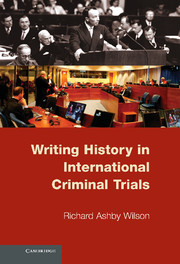Book contents
- Frontmatter
- Contents
- Epigraph
- Preface and Acknowledgments
- Figures and Tables
- Glossary
- 1 Assessing Court Histories of Mass Crimes
- 2 What Does International Actually Mean for International Criminal Trials?
- 3 Contrasting Evidence: International and Common Law Approaches to Expert Testimony
- 4 Does History Have Any Legal Relevance in International Criminal Trials?
- 5 From Monumental History to Microhistories
- 6 Exoneration and Mitigation in Defense Histories
- 7 Misjudging Rwandan Society and History at the International Criminal Tribunal for Rwanda
- 8 Permanent Justice: The International Criminal Court
- 9 Conclusion: New Directions in International Criminal Trials
- Appendix: Methodology and the Survey Instrument
- Bibliography
- Index
4 - Does History Have Any Legal Relevance in International Criminal Trials?
Published online by Cambridge University Press: 05 June 2012
- Frontmatter
- Contents
- Epigraph
- Preface and Acknowledgments
- Figures and Tables
- Glossary
- 1 Assessing Court Histories of Mass Crimes
- 2 What Does International Actually Mean for International Criminal Trials?
- 3 Contrasting Evidence: International and Common Law Approaches to Expert Testimony
- 4 Does History Have Any Legal Relevance in International Criminal Trials?
- 5 From Monumental History to Microhistories
- 6 Exoneration and Mitigation in Defense Histories
- 7 Misjudging Rwandan Society and History at the International Criminal Tribunal for Rwanda
- 8 Permanent Justice: The International Criminal Court
- 9 Conclusion: New Directions in International Criminal Trials
- Appendix: Methodology and the Survey Instrument
- Bibliography
- Index
Summary
INTRODUCTION
Criminal Courts exist for the purpose of establishing individual accountability – not…to provide an official history. To the extent that a historical record is integral to individual trials, it may be said that this is incidental to the work of the ICTY, but it is not its primary purpose.
– Ralph Zacklin, UN Assistant Secretary-General for Legal Affairs (2004:544)These chambers have produced histories that are not only credible and readable, but indispensable to understanding the origins and course of the 1990s conflicts in the former Yugoslavia.
– Robert Donia (2004:2), ICTY Expert WitnessIs historical debate incidental or indispensable to international criminal trials? Without a doubt, the historical record left by international criminal trials is indispensable for historians and political scientists seeking to comprehend an armed conflict. No student of the Balkans or Rwanda can afford to ignore the Tribunals' judgments and the new evidence revealed in the trials, from insider and eyewitness testimony to telephone intercepts and the massive archives of government documents detailing the operation of local, regional, and national political institutions before and during the conflicts. Yet the reverse is not exactly true: historical accounts produced by historians and political scientists are not always indispensable to international criminal trials. The majority of trials have proceeded without academic experts, and no accused has ever been convicted on the basis of historical evidence alone.
- Type
- Chapter
- Information
- Writing History in International Criminal Trials , pp. 69 - 111Publisher: Cambridge University PressPrint publication year: 2011

